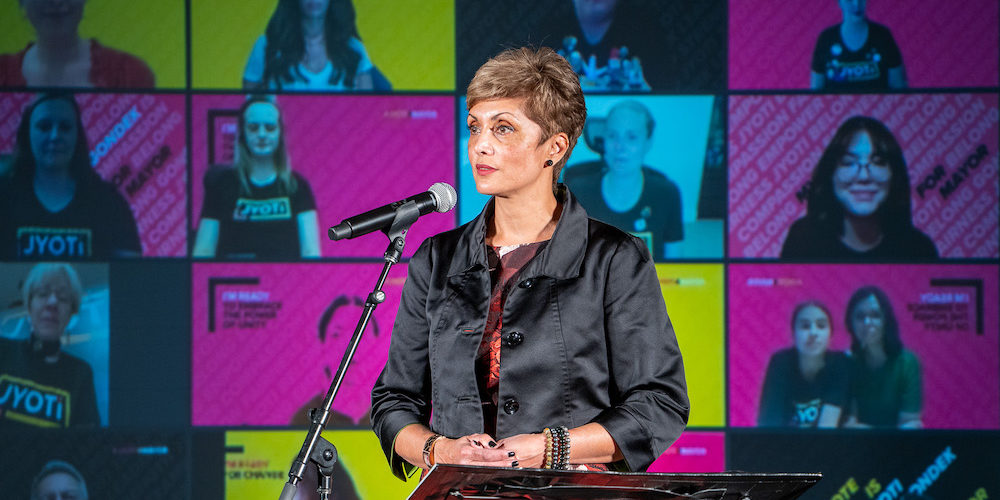Many of Alberta’s highest-decibel conservative loudmouths were by turns appalled and furious yesterday at the outcome of Monday’s province-wide municipal elections.
The votes saw progressive mayors and councils elected in the province’s two largest cities and many other signs this place is changing for the better.
Lorne Gunter, Postmedia’s reliably right-wing Edmonton political columnist, practically wept in yesterday morning’s Sun. “If anything, we will have an even more left-leaning council than before Monday’s election,” he moaned, apparently incredulous.
Two new faces on city council, he complained, Michael Janz and Ashley Salvador, “are reliable leftists. They will fit right in with the Bobblehead Majority on council — the seven (and now perhaps nine) councillors who sit there and nod in unison every time administration puts forward an expensive, shiny, pie-in-the-sky plan to socially re-engineer how we live our daily lives.”
In Calgary, reputed petroleum industry billionaire and right-wing social media hysteric W. Brett Wilson didn’t even try to hide his fury and anguish.
Having heard that Calgary Mayor-elect Jyoti Gondek’s intended first order of business once she’s sworn will be to recognize reality and declare that we are in a climate emergency, Wilson screeched: “Who fucking voted in this mess?”
A significant plurality of the good people of Calgary, it would seem, despite the best efforts of Jason Kenney’s United Conservative Party and many a commentator like Gunter and Wilson.
Alberta’s custom of holding all the province’s municipal elections on the same day allows politically alert observers an opportunity every four years to discern some trends that might not be obvious at first glance were we only looking at one community.
As the city council tallies in Edmonton and Calgary show, Alberta’s population, in its large urban areas at least, is home to significant numbers of voters who think and vote like ordinary Canadians everywhere. That is to say, they are small-p progressives.
Progressive councillors now outnumber conservatives by a two-to-one margin on Calgary City Council, Alberta pollster Janet Brown told the CBC.
The situation is even more striking in Edmonton, with a clear majority of councillors now on the progressive side, led by Mayor-elect Amarjeet Sohi, former bus driver, trade union activist, political prisoner and Liberal cabinet minister.
Edmonton voters also “fired,” as UCP supporters like to say mockingly when things are going their way, three well-known right-wing councillors, Tony Caterina, Moe Banga and Jon Dziadyk. And they said so long to a fourth, Mike Nickel, by decisively rejecting him as mayor.
“The province will once again have two relatively progressive mayors as counterpoints to Premier Jason Kenney’s UCP government,” observed columnist Don Braid of the Calgary Herald, noting that both are people of colour and Gondek will be the first woman mayor in Calgary’s history.
This doesn’t mean smooth sailing, of course. Kenney’s party doesn’t play nice with opponents, and the opportunities for his government to make things difficult for Alberta’s big cities will be legion. The instinct to lash out with Trumpian fury will be hard for the Kenney government to control.
Other signs Monday that the election of Rachel Notley’s NDP majority government in 2015 might have been something more than the fluke Alberta conservatives insisted it was at the time included an almost clean sweep of public school trustees in Edmonton and Calgary who reject the controversial primary school curriculum still being flogged by Education Minister Adriana LaGrange.
“It looks like all of the CBE trustees and 8/9 EPSB trustees are against the draft curriculum,” tweeted Alberta Teachers Association communications coordinator Jonathan Teghtmeyer Monday night. “Tonight voters soundly rejected this awful draft curriculum. Trash the draft Adriana!”
Despite the UCP’s fingers on the scale, even Kenney’s constitutionally meaningless anti-equalization referendum and his fatuous Senate nominee election votes — the results of which won’t be known for several days for no good reason — are unlikely to be much of a boon to the premier.
The anti-equalization question, misleading wording and all, will pass, but with only tepid support in the big cities. The Senate election is an exercise in futility anyway. There will be more said here on those topics when better numbers are available to analyse.
Voters seem also to have rejected the other referendum pushed by the UCP, permanent daylight savings time, and in Calgary they even voted to restore fluoride to the water supply.
In the meantime, the Monday-night brouhaha with Elections Alberta’s angry UCP-style tweetery appears to have legs, and perhaps the potential to grow into a scandal. Expect stories from major news organizations soon on what the heck is going on at that now-self-discredited office of the legislature.
So, with the next big political event in Wild Rose Country likely to be the provincial election expected in 2023, the events of Oct. 18 could turn out to be a useful analytical tool for all Alberta political parties.
For the NDP, the results indicate a large number of voters in the NDP universe, even if they’re not lifelong New Democrats. That probably means the party should stay the course charted by Notley, now the Opposition Leader in the legislature.
If the UCP were using their heads, they would take the results as a hint to dial back their full-on rage at progressive ideas and the people who advocate them, and to tone down the constant stream of snot-o-grams emanating their issues managers’ social media accounts.
They might also want to take it easy on their tendency to engage in anti-Canadian “fair deal” harangues, too, since a large and vocal opposition to their approach has spontaneously emerged as a response to their referendum.
There are UCP politicians who seem to get this. Jobs, Economy and Innovation Minister Doug Schweitzer, the MLA for Calgary-Elbow, gracefully congratulated Mayor-elect Gondek on Monday night.
But the probability is high Kenney and his inner circle lack the humility to learn from Monday’s lesson.
So the chances are good that if Kenney remains, the UCP will be gone in 2023 or whenever the next election is called.



